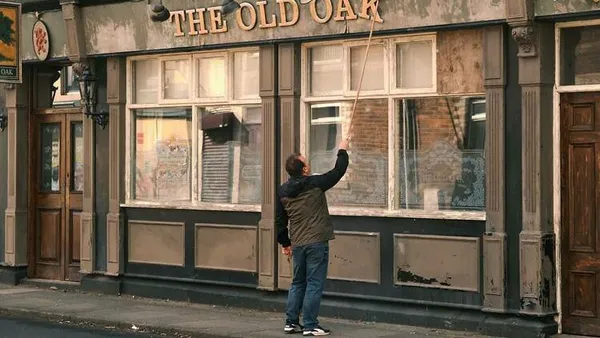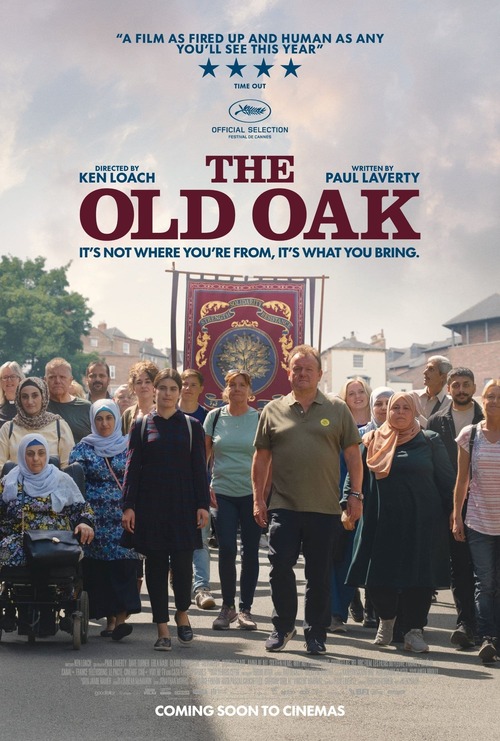Eye For Film >> Movies >> The Old Oak (2023) Film Review
The Old Oak
Reviewed by: Andrew Robertson

Oaks appear 14 times in the King James Version. A place of nourishment, a place of offering, for angels and idols alike, a place of shelter, for Absalom the sometimes favoured son a place of betrayal. I go to the Bible for The Old Oak because it transpires as a series of didactic vignettes, something timeless in its testimonies. That name for pubs not uncommon, often believed to be adapted from The Royal Oak. That tree too gave succour, that Charles from Cromwell after the battle of Worcester. A different English Civil War than the one in Ken Loach's most recent film.
'Civil war' carefully. The story, such as it is, the story of a pub, a place, specifically two within it. TJ, portrayed by Dave Turner, Yara, by Ebla Mari. Loach often uses nontraditional actors, untrained, the proximate, and in that sense moments in the Old Oak are perhaps more like the communal mystery plays of old. The roots of pantomime, with some exaggeration; within and around it moral lessons, Papal edicts eventually transferring them from clergy to town guilds. Those guilds become the unions. Those unions become dust. Yara, her family, others, refugees from Syria. In one of sets of scenes that may be disturbing to viewers clips of the aftermath of that State violence, schools bombed, towns hollowed out, made victim.

There is a notion of a 'cold civil war', a frequent element in some discussions of American politics. Discussions of English Civil Wars combine at least three into one, ignore the Jacobite Rebellions, The Anarchy, the Barons' Wars, the American Revolutionary, and that list itself excludes other civil wars that British troops were key to. Africa, especially the south, Ireland, similarly. In a march there's a banner for the International Brigades, but the streets here are now emptier than those of Guernica. What is a civil war? Ideology allowing the destruction of places within the homeland, an othering, consequence. There's mention of the paramilitary militias of Syria, 'the ghosts', and a photograph of Her Majesty's Constabulary during the Miner's Strikes.
When Thatcher said there was no such thing as society she also said "no government can do anything except through people," which is a stunning conceit to collectivism and a distinct surrender for a legislator with executive authority. She also said "people look to themselves first." With as much kindness as I can muster that might have been about self-reliance, but that is too often and easily replaced with selfishness.
This feels like a lecture, this review, even as I write it, and I don't know if that's because The Old Oak does too. Loach is not the flashiest of directors, Robbie Ryan as a regular collaborator has done much more extravagant work. How much of that is from more opulent circumstances like Medusa Deluxe or The Favourite isn't certain. One small moment during another distressing scene of violence between animals doesn't show us the aftermath but does show us the emotional reaction. There's a score by another regular collaborator, George Fenton, but it was vision that caught me, not strings. Sunlight dappled through the leaves of the trees falling alternately on face and head, brow and pate differently haired, the warmth of the sun catching the skin and flesh beneath as a mammalian memento mori. It's one of a few places where events have further caught up with what is presented as loose history.
Our scene is set as "The North of England, 2016," but the large dogs barely controlled on the streets and the viral videos of bullying dressed as justice have been superseded. In the period detail, such as it is, a videogame too new, but I'd wondered if the use of Supermassive's Dark Pictures: The Devil In Me was a nod to previous colleagues. It features Jessie Buckley and Paul Kaye, and even after checking I was surprised they weren't Loach alumni. There's a bit of trolling too, I'm online and jaded enough to imagine someone sending a burning "live laugh love" to Cathy over Instagram. The cruelties here aren't as arch, but they're no less constructed.
I'll use another university word, synecdoche, one of the many forms of symbolism that, as with social media trouble, Loach is canny and dogged with. The back room of The Old Oak is morality made manifest, a microcosm of community concerns. Underinvested, underused, written off rather than underwritten. It's inherently British this, if not English, to the extent that there's a discussion of house prices. The whole of it is inflected by grief, a flatness of affect that isn't just from an amateur cast operating close to real tragedy. There's use on several occasions of "humiliated" and attached to that is a set of expectations of masculinity and more. The deep pits were struggling, three miles out is nowhere to find coal in an era of bulk cargo international commerce. Deindustrialisation as practised was as brutal as many post-war settlements but there wasn't a reconstruction, barely an acknowledgement.
"Not charity, solidarity" is one of the repeated lines. I'll offer the film the same. It is slow, a bit under two hours, but the pace is itself a symptom. Change isn't quick. Will anyone see this who wouldn't anyway? Maybe. Loach has been doing this for 60 years, near enough, and if he's still the same quality film-maker it's fair to say that lots around him has gotten worse. I wouldn't say this has a happy ending, just a moment of something approaching happiness, near the end. Or at least where it stopped, because there isn't an ending here. There are individual men and women and there are families, and that's what community is. Loach and his process aren't ostentatious enough to take a bow, but this isn't a branching out. This Old Oak too is a place of nourishment, a place of offering. To whom is a different question. Loach may be on the side of the angels, rarely idle, but this is ultimately more preaching to the converted.
Reviewed on: 26 Sep 2023

















